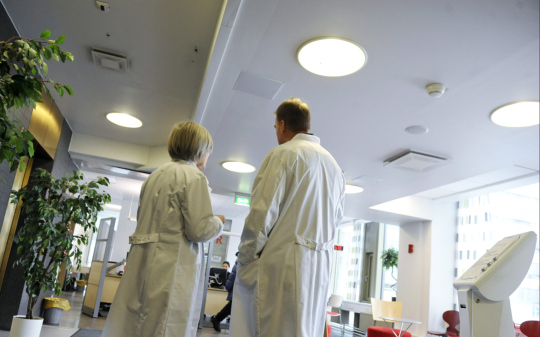It was hardly a surprise when a March 2013 survey by the independent market research company Taloustutkimus concluded that 70 per cent of Finns believe they can benefit from e-health services. What raises the eyebrows is the fact that there are so few services of this kind available in a country that prides itself on its technological know-how.
“According to the survey Finnish people think very positively about e-services in healthcare – they are just waiting for the new services,” says Sitra senior lead Tuula Tiihonen. “Testing new services is one way to provide experience of them – and we are making that possible in our pilot projects.”
As Tiihonen points out, Finnish people have plenty of experience of mobile technology: “Finland was one of the first countries to transform society by means of e-services in the banking sector, for instance. They have seen the benefits. But we have also learned a lot and we know that technology is not the most important driver. Rather, it is a matter of understanding human behaviour, ethical questions, motivation factors as well as people’s preferences – and we need to learn much more about that.”
Electronic services allow a shift in emphasis in healthcare from treating illnesses to promoting health. “Advanced healthcare e-services enable efficient prevention and effective after-treatment,” says Tiihonen. “Quick responses to changes in healing processes and personal treatment facilitate faster recovery. These services will allow citizens to take control of their well-being before poor health casts its shadow. A variety of e-services enable citizens to take a holistic view of their own health.”
Award-winning healthcare
Sitra is involved in a number of pilot projects with local authorities, companies and district hospitals in Finland, with its programmes following three main strands.
The first is centred around new e-services for individuals, such as electronic maternity cards for mothers’ personal health records and electronic services for the elderly, which are designed to encourage them to take more exercise and be more physically and socially active.
Secondly, Sitra is piloting new models enabling healthcare providers to meet and anticipate patient needs more effectively. These include welfare stations with virtual doctor facilities and a self-monitoring system. Sitra is also launching new e-services for health kiosks to boost preventive care.
And thirdly, a pilot project in cooperation with the Institute for Molecular Medicine Finland and the Finnish Red Cross is scheduled to get under way in autumn 2013, whereby personal health profiles can be used to compile guidelines for a healthy life.
Meanwhile, the Finnish specialist health and security company Vivago, partly owned by Sitra, recently received a silver medal in the EU’s eHealth Competition. This was a prestigious recognition of the company’s efforts to promote preventive care and bring down the cost of healthcare.
Sitra has also invested 1.6 million euros in Omegawave, which makes use of mobile sensors to quickly assess the physiological condition of the user, issuing measurements detailing physical and cardiovascular stress levels, physical condition development and training readiness alerts using “cloud” services.
“I think we don’t have any choice but to take more advantage of e-services for health,” says Tiihonen. “Self-care services and preventive care are a way to increase the well-being of Finns and to target healthcare services more effectively.”
Tim Bird




Recommended